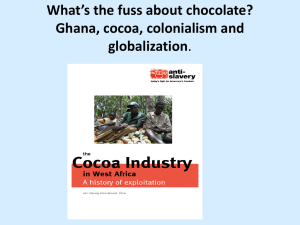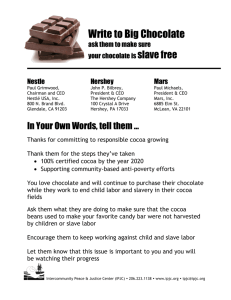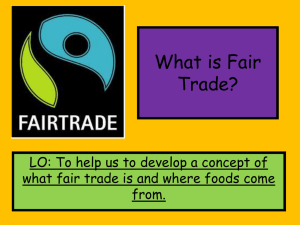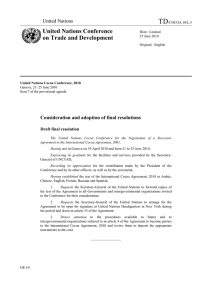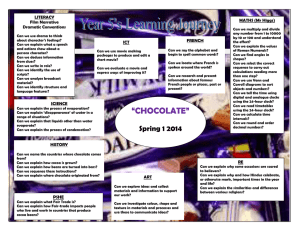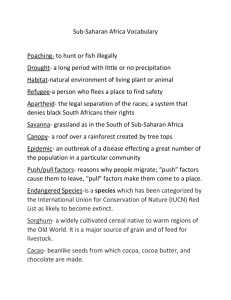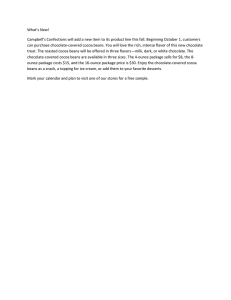As a tropical country, Ghana not only houses the best... meet but also known for its richness in cocoa. Its... /
advertisement
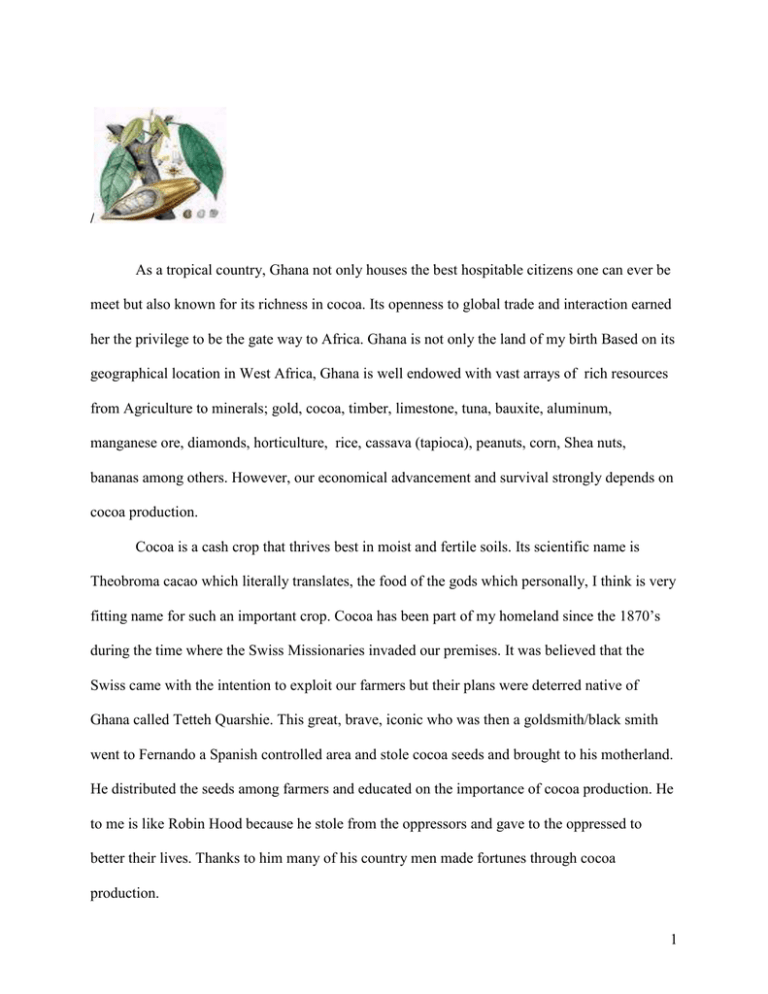
/ As a tropical country, Ghana not only houses the best hospitable citizens one can ever be meet but also known for its richness in cocoa. Its openness to global trade and interaction earned her the privilege to be the gate way to Africa. Ghana is not only the land of my birth Based on its geographical location in West Africa, Ghana is well endowed with vast arrays of rich resources from Agriculture to minerals; gold, cocoa, timber, limestone, tuna, bauxite, aluminum, manganese ore, diamonds, horticulture, rice, cassava (tapioca), peanuts, corn, Shea nuts, bananas among others. However, our economical advancement and survival strongly depends on cocoa production. Cocoa is a cash crop that thrives best in moist and fertile soils. Its scientific name is Theobroma cacao which literally translates, the food of the gods which personally, I think is very fitting name for such an important crop. Cocoa has been part of my homeland since the 1870’s during the time where the Swiss Missionaries invaded our premises. It was believed that the Swiss came with the intention to exploit our farmers but their plans were deterred native of Ghana called Tetteh Quarshie. This great, brave, iconic who was then a goldsmith/black smith went to Fernando a Spanish controlled area and stole cocoa seeds and brought to his motherland. He distributed the seeds among farmers and educated on the importance of cocoa production. He to me is like Robin Hood because he stole from the oppressors and gave to the oppressed to better their lives. Thanks to him many of his country men made fortunes through cocoa production. 1 Moreover, Ghana’s tropical rain forest earth proved to be an excellent environment for cocoa trees to grow. Its fertile soils have the right mineral content and clean water to promote the growth of the crop. The ability of cocoa trees to grow among other crops is an added bonus for our farmers. According to Jamieson Chocolate website, “cocoa is produced primarily by independent local farmers with small to moderate-sized holdings, not on the large plantations used in many parts of the world”. This small scale style of farming gives our farmers the advantage of producing quality cocoa because they are able to devote more of their attention and effort on their cocoa. This is one of the main reasons why Ghana is the second leading country in the world in terms of cocoa production as shown in the data table below. This table was derived from both Wikipedia and international-tariffs’ websites which represents the numerical breakdown of the worlds leading producers of cocoa. Country Amount produced Percentage of world production Côte d’Ivoire 1.3 million tonnes Ghana 720 thousand tonnes 20.7% Indonesia 440 thousand tonnes 12.7% Cameroon 175 thousand tonnes 5.0% Nigeria 160 thousand tonnes 4.6% 37.4% 2 Brazil 155 thousand tonnes 4.5% Ecuador 118 thousand tonnes 3.4% Dominican Republic 47 thousand tonnes 1.4% Malaysia 30 thousand tonnes 0.9% In Ghana, Cocoa cultivating and processing is not an individual affair. It is a social event which is often referred to as communal labor. According to Jamieson website, prior to the actual cocoa planting, our farmers are educated by Agricultural extension workers on the best ways to protect and prevent pests’ infestations without over exposing their crops to toxic chemicals and sprays. The extension workers are in turn supported by continuous research carried out at the Cocoa Research Institute of Ghana-Tafo. This research center is able to develop new cocoa hybrids using forastero and trinitario stock. There are also two major harvesting seasons for our farmers; the bigger season commences in October and ends in February and the small one is from May to August. During each season, the community members are required to aid the farmers especially in the rural areas. After harvests, the group gathers the harvested cocoa and carries them to the farmers’ vicinity. There, they proceed to cut open the golden pods (cocoa) and the seeds are scooped and piled on clean banana leaves. After all the seeds are assembled, they are thoroughly covered with more banana leaves to keep them clean and warm. Each day, for five to six days after gathering the seeds, the farmers personally stir the heap of beans (seeds). This process is very essential to 3 maintain and bring out the original flavor of cocoa. Since our farmers process smaller amounts of cocoa at a given time, they ensure that the adequate fermentation level is achieved, thus another reason why our cocoa is in high quality. After fermentation, comes sun drying of seeds; the seeds are sundried on bamboo boards covered with rush mats. According to the website, this process of drying is preferred by our farmers because it does not produce “off flavors” in the cocoa beans. Finally, the dried beans are packed in to special jute bags called “kokotu” and then carried buying agents in the local area for marketing. Cocoa has many benefits but the worldly known one is the production of chocolate. Chocolate, to many, is used to show one’s love and affection towards another. Hence, it is very popular on Saint Valentine’s Day not only in my country but globally. Chocolate is made out dried refined cocoa beans. Chocolate aside from its sweet smell and delicious taste has several health advantages. For instance, an article in the London “Times” read that chocolate has the ability to combat heart diseases. According to an article from The Lancet posted on Jamieson’s website, a study done by Andrew L. Waterhouse and researchers of University of California found out that “chocolate contains significant levels of phenol, which prevents oxidation of a specific type of combined fat and protein complex in the blood. Oxidation of these low density lipoproteins is known to be linked to furring of the arteries which can lead to heart attacks. A 41-gram piece of milk chocolate was found to contain 205 mg of phenol, compared with 210 mg in a glass of red wine. Two tablespoons of cocoa had 146 mg of phenol.” However, it stated that Dark chocolate had more phenol than milk chocolate." Chocolate may increase the amount of anti-oxidant in the body which aids in eliminating free radicals that may cause harm to the body. Another article on that same website said that similar research “suggest that dietary intake of cocoa rich in 4 antioxidant flavonoids may reduce the risk of atherosclerosis, and morbidity and mortality from coronary heart disease. The caffeine content of cocoa is 0.009% by weight, compared with coffee (0.04%), black tea (0.06%, and green tea (0.01%)." Scientists at the University of Westminster also found out that Chocolate can be good for you, especially if you sniff it. Its smell has been shown to boost the immune system. Remember that warm feeling you get when you sink your teeth into a chocolate bar, study as shown that chocolate has the ability to increase serotonin levels in the body. This serotonin is a hormone that regulates mood thus the sweet feeling. Therefore, forego your inner fears and indulge yourself in a bar of chocolate preferable the dark ones because it is actually very healthy for you. The cocoa shells also have many beneficial values. It can either serve as food or fruit, use as medicine, or made into calabash which as a very cultural function. The calabash in many traditional beliefs in Ghana represents wealth and fertility. During customary marriages, the bride is often gifted with the calabash from either her mother or mother-in-law. This present is to wish her well in her marriage and to enhance her fertility. The bride-groom is made to drink from the calabash through out the entire ceremony; this act is believed to bring wealth and happiness into their new household. The cocoa leaves as well as the shell are used in preparing herbal medicines, body creams to cure blemishes and acne and hair products to build up strong healthy hair. In conclusion, cocoa has been and still is the backbone of my motherland. It is very mush a part of our culture as well as our economy. Even though, Ghana is a developing (third world) country, politically, cocoa has made her a powerful force to be reckoned with in terms of its agriculture. Therefore, the next time, you bite into a bar of chocolate or use any by-product of 5 cocoa, remember the role Ghana played in terms of cocoa production. Long live Ghana and its rich resources especially cocoa help elevates us economically unto higher grounds. 6 Work Cited Andrew L. Waterhouse, Joseph R. Shirley, Jennifer L. Donovan, The Lancet, Vol. 348, No. 9030, 21 Sept 1996, P. 834. K. Kondo, R. Hirano, A. Matsumoto, O. Igarashi, H. Itakura, The Lancet, Vol. 348, No. 9040, 30 Nov 1996, p. 1514. “The Times” London, 20 Sept 1996 The Lancet, Vol. 348, No. 9040, 30 Nov 1996, p. 1514. Michael D. Lemonick, Time, Sept 2, 1996, p. 58. Paula Dranov, "Chocolate! Confessions of a Chocolate Freak", 1998, pp. 12-13. Sun-Times, Aug 11, 1998. http://international-tariffs.suite101.com/article.cfm/top_cocoa_chocolate_exporters http://www.chocolatebyjamieson.com http://en.wikipedia.org/wiki/Cocoa 7
